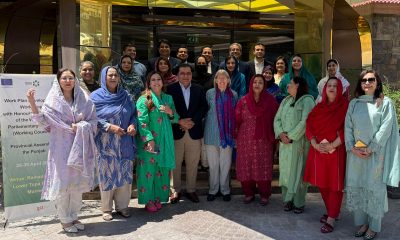
The Pakistan Institute for Parliamentary Services (PIPS), in collaboration with Mustehkam Parlimaan and GIZ, organised a three-day Workplan Development Workshop for the Honourable Members of the Women’s Parliamentary Caucus, Provincial Assembly of the Punjab from 28th to 30th April 2025 at Ramada Hotel, Murree.
The workshop aimed to strengthen the institutional capacity of the Women’s Parliamentary Caucus by equipping Members with tools for strategic planning, priority setting, and effective workplan development. Through interactive sessions on vision building, SWOT analysis, action planning, and monitoring strategies, Honourable Members collaborated to design a roadmap to amplify women’s leadership and legislative impact.
The inaugural session was warmly moderated by Ms. Samer Awais, Director General Parliamentary Development and Coordination (PDP&C), who welcomed the participants and highlighted the vital role of Women Caucuses in promoting inclusive and participatory democratic processes, and safe environment for the women of Punjab to enable them achieve their ambitions.
Mr. Asim Khan Goraya, Executive Director PIPS, formally inaugurated the workshop. In his inspiring welcome address, he underscored the significance of institutionalising women’s leadership within parliamentary frameworks. He highlighted that gender-responsive governance must be built on a foundation of strategy, structure, and strategic foresight. Mr. Goraya reaffirmed PIPS’ commitment to promoting evidence-based lawmaking and participatory governance. He encouraged participants to engage in candid assessments through SWOT analysis and strategic planning, stressing that transformational leadership requires both courage and clarity. Mr. Goraya also noted the international recognition PIPS has received for parliamentary development but underlined that the real measure of success lies in the impact created for and by Pakistan’s legislators.
Following this, Ms. Mary Cummins, Team Lead of Mustehkam Parlimaan, reflected on the global and local challenges in women’s political participation. Citing Ireland’s example, she shared how legislative gender quotas have raised the number of women candidates, though cultural and structural barriers still limit real representation. She stressed that beyond quotas, political parties must invest in mentorship, training, and placing women in winnable constituencies. With women still comprising just 25% of Ireland’s lower house and Pakistan ranking even lower globally, she emphasised the need for stronger political will and institutional support. Mary encouraged the Honourable Members to use this workshop as a space for reflection, collaboration, and to drive real and lasting change.
The Chief Guest, Honourable Begum Ishrat Ashraf, Convener of the Women’s Parliamentary Caucus, Provincial Assembly of the Punjab, graced the occasion with her presence. She congratulated the participants and the organising partners for this significant initiative in women empowerment. In her address, Begum Ishrat Ashraf reiterated her steadfast commitment to strengthening the WPC Punjab, underlining the importance of a collective vision, strategic advocacy, and unity among women parliamentarians to drive gender-responsive legislative reforms.
Later, Mr. Ali Imran, Key Expert (Legislative & Parliamentary Affairs), Mustehkam Parlimaan, conducted an insightful session on the history and development of women’s political participation in Pakistan. He traced the milestones of women’s representation from the early years of independence to the present, highlighting the constitutional provisions safeguarding women’s rights, such as Articles 25, 34, and 35 of the Constitution. Mr. Imran also explained the global context of Women’s Parliamentary Caucuses, noting that over 81 WPCs have been established worldwide to enhance women’s participation in legislatures. He described the formal establishment of the Punjab WPC through Rule 235-B of the Rules of Procedure, with its notification issued in December 2024, and explained the four key stages in establishing an effective caucus: assessing the environment, laying the foundation, getting the caucus operational, and putting it into action through strategic planning.
Day 2 of the workshop focused on strategic reflection, priority setting, and forward planning for the Women’s Parliamentary Caucus. The day began with an engaging session led by Mr. Azhar Saeed, Strategic Planning Expert from Mustehkam Parlimaan, who introduced the participants to the SWOT analysis framework. Honourable Members were divided into two groups and guided to critically assess the internal strengths and weaknesses, as well as external opportunities and threats, facing the WPC Punjab. This interactive exercise allowed Members to reflect on both institutional and legislative challenges. Building on these insights, Ms. Samer Awais, Director General PDP&C at PIPS, invited the participants to identify key priority areas that could be realistically achieved within the 2025–26 work cycle. The day concluded with Mr. Saeed inviting Members to formulate a vision and mission statement for the WPC, rooted in the outcomes of their strategic group work. The Members demonstrated enthusiastic participation throughout the day, appreciating the clarity and direction that the exercises brought to their shared institutional goals.
Day 3 of the workshop shifted focus to technical knowledge and parliamentary tools that can support gender-responsive governance. The day opened with a comprehensive session by Dr. Wasim Shahid Malik, Senior Economist and Consultant, who offered participants a broader economic perspective, helping them contextualise fiscal decision-making within the larger development framework. This was followed by an insightful presentation by Ms. Ayesha Javed, Deputy Secretary (Budget), Ministry of Finance, who introduced the principles and practices of Gender-Responsive Budgeting (GRB). She illustrated how fiscal tools can be leveraged to advance gender equity and outlined practical steps parliamentarians can take to promote gender-sensitive financial oversight. Both sessions were exceptionally well received, with participants expressing keen interest in having more in-depth interactions with the presenters in the future.
The final session of the workshop was conducted by Mr. Ali Imran, Key Expert (Legislative & Parliamentary Affairs), MuP, who introduced the participants to Post-Legislative Scrutiny (PLS). He outlined tools and approaches that could be used by women parliamentarians to assess the implementation and impact of pro-women laws—bridging the gap between legislation and accountability.
The day concluded with closing remarks by the Honourable Begum Ishrat Ashraf, Convenor of WPC Punjab, who appreciated the quality and relevance of the sessions and stressed the need for more capacity-building initiatives focused on best practices from Women’s Parliamentary Caucuses around the world. She congratulated both PIPS and MuP for organising such a productive and enriching workshop.